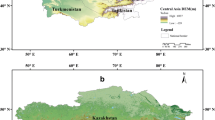Abstract
In the twenty-first century, the problems caused by climate change are becoming increasingly apparent, especially in developing countries such as those in Southeast Asia. As scientists, we have been hoping to strengthen our academic relationship on this thesis to cooperate and fight against such global problems. Nevertheless, the effects of climate change are not the same in any region of the world. Therefore, attention must be paid to each individual, and it is vital to connect them interlocally. If we could relativize the problems of each country and region, and analyze and examine them more objectively from different angles by networking such research bases, we would likely be able to produce significant results in regard to the sustainable development of this region.
You have full access to this open access chapter, Download chapter PDF
Similar content being viewed by others
In the twenty-first century, the problems caused by climate change are becoming increasingly apparent, especially in developing countries such as those in Southeast Asia. As scientists, we have been hoping to strengthen our academic relationship on this thesis to cooperate and fight against such global problems. Nevertheless, the effects of climate change are not the same in any region of the world. Therefore, attention must be paid to each individual, and it is vital to connect them interlocally. If we could relativize the problems of each country and region, and analyze and examine them more objectively from different angles by networking such research bases, we would likely be able to produce significant results in regard to the sustainable development of this region.
We spent a lot of time fostering these ideas among our colleagues from Vietnam, the Philippines, Thailand, and Indonesia until finally launching our network project in late 2018. This ambitious network, named “The Southeast Asia Research-based Network on Climate Change Adaptation Science (SARNCCAS),” aims to network researchers from various disciplines in Southeast Asian countries and Japan to encourage different voices toward a common message for climate change adaptation science and contribute to the research base and community-based research (Fig. C1.1). The next generation of young researchers and students also plays an essential role in this network.
Like other countries, Japan also has been strongly affected by climate change in recent years, for example, by experiencing heavy rainfall disasters. Hence Japan has been working on countermeasures as an advanced problem-solving country from the early stage. Sharing these experiences can be expected to play a beneficial role in networking activities. This concept can be applied to other network member countries as well. Unlike research institutes in Western countries that are trying to do the same thing, Southeast Asian countries and Japan could share their lessons learned under a common foundation of the East. SARNCCAS, aiming to construct a network between all Southeast Asian countries, will also focus on the commonality and diversity of cultures and ways of thinking in Asia.
In the time it has taken for this book to be published, we held international workshops in Hanoi, Vietnam, in 2018 and 2019 (Fig. C1.2). Furthermore, we found that the network can continued to function robustly even under the challenging circumstances of the Coronavirus 2019 pandemic. Network members were able to work together online that incorporated new approaches such as virtual fieldwork for everyone online in 2020 (Fig. C1.3). Each seminar was attended by about 100 researchers and students, who shared their own lessons learned with everyone.
“Sharing is Learning” is the core message of SARNCCAS, which means listening to, appreciating, respecting, and learning from each individual and the entire group. This book is one of the achievements of this networking. We expect to continue to generate more interlocal knowledge in the future while making use of these new connections.
Author information
Authors and Affiliations
Corresponding author
Editor information
Editors and Affiliations
Rights and permissions
Open Access This chapter is licensed under the terms of the Creative Commons Attribution 4.0 International License (http://creativecommons.org/licenses/by/4.0/), which permits use, sharing, adaptation, distribution and reproduction in any medium or format, as long as you give appropriate credit to the original author(s) and the source, provide a link to the Creative Commons license and indicate if changes were made.
The images or other third party material in this chapter are included in the chapter's Creative Commons license, unless indicated otherwise in a credit line to the material. If material is not included in the chapter's Creative Commons license and your intended use is not permitted by statutory regulation or exceeds the permitted use, you will need to obtain permission directly from the copyright holder.
Copyright information
© 2022 The Author(s)
About this chapter
Cite this chapter
Ito, T., Kotera, A. (2022). The Southeast Asia Research-Based Network on Climate Change Adaptation Science (SARNCCAS) -Weaving the Wisdom of Climate Change Adaptation into Glocal Networks-. In: Ito, T., Tamura, M., Kotera, A., Ishikawa-Ishiwata, Y. (eds) Interlocal Adaptations to Climate Change in East and Southeast Asia. SpringerBriefs in Climate Studies. Springer, Cham. https://doi.org/10.1007/978-3-030-81207-2_11
Download citation
DOI: https://doi.org/10.1007/978-3-030-81207-2_11
Published:
Publisher Name: Springer, Cham
Print ISBN: 978-3-030-81206-5
Online ISBN: 978-3-030-81207-2
eBook Packages: Earth and Environmental ScienceEarth and Environmental Science (R0)







